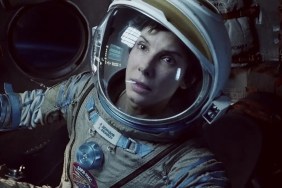
Alfred Hitchcock‘s Foreign Correspondent is exactly the kind of film that benefits from a Criterion Collection release. I don’t consider this to be one of Hitch’s “best”, but at the same time it’s got the elements that make his films fascinating, and, most importantly, entertaining. And Criterion always does a great job bringing a focus to some of Hitchcock’s less discussed gems.
Add to that, Foreign Correspondent carries an additional weight as a result of its place in history as a propaganda film, emphasized most in Joel McCrea‘s speech at the end of the film amid the bombing of London, warning those back in the U.S. just what exactly Germany was up to. The scene was added after filming had already wrapped, just over a month before the film would actually hit theaters.
Following Rebecca, Foreign Correspondent was Hitchcock’s second American feature. Both would be nominated for Best Picture with Rebecca eventually winning while Correspondent lost in all six categories it was nominated in.
The film follows the professional life of Johnny Jones (McCrea), given the pseudonym Huntley Haverstock as he’s assigned a position overseas for the New York Globe as the threat of war looms and the news out of Europe doesn’t seem to represent the truth. Portrayed as a journalist more interested in the news than writing puff pieces, Jones finds himself knee-deep in conspiracy all while courting Carol Fisher (Laraine Day), daughter to international peace activist Stephen Fisher (Herbert Marshall). Eventually a Dutch diplomat is believed to be assassinated, people aren’t who they seem, romance blossoms and war breaks out.
The political motivations behind the narrative are as relevant today as they were then, perhaps even more so as cable news considers Justin Bieber‘s arrest “Breaking News” and argues agenda more than reports the news. To that effect, however, the film’s place in history as a propaganda feature is also worthy of note as I’m sure many would argue the motivation behind films such as Zero Dark Thirty or even Lone Survivor. I wouldn’t, but I’m sure some people would.
While the narrative isn’t as tight as many of Hitchcock’s greats, it deserves to be mentioned (or at least not forgotten) alongside the likes of The 39 Steps and North by Northwest and it certainly isn’t without signature Hitchcock moments. A scene in which Jones must remain hidden inside a windmill as the truth behind an assassination is revealed is pure Hitchcock and if you’re looking for bluntness, just watch what happens to one British aristocrat as she refuses to put on a life vest when a passenger plane flying over the Atlantic finds itself mistaken for a military aircraft and begins taking fire.
Hitchcock always had a knack for balancing tense moments with bits of the comedic as evidenced by another scene in which Jones escapes two would-be assassins in his hotel room as well as another attempt on his life courtesy of a so-called bodyguard named Rowley (Edmund Gwenn), who just can’t seem to find the right time to give the American do-gooder a push. And finallly, I must mention George Sanders, an actor whose posh performances are always a highlight, his performance here every bit as delightful as his work in another personal favorite of mine, All About Eve.
Criterion’s 2K digital restoration from the original negative is impressive as hardly a scratch can be seen (check out DVD Beaver’s screen captures) and a new interview with writer and Grantland.com contributer, Mark Harris, titled “Hollywood Propaganda and World War II” is a perfect starter for Harris’ newest book hitting shelves this month, “Five Came Back” taking a look at how World War II changed Hollywood using the lives of directors John Ford, William Wyler, John Huston, Frank Capra and George Stevens to tell the story. I’m just over 100 pages into the book and it’s a bit of a long read as Harris clearly did his research and doesn’t leave any detail out, but it is equally fascinating.
[amz asin=”B00GPPXNEE” size=”small”]Also included is a 1972 interview with Hitchcock from the “Dick Cavett Show” (watch it here), a 1946 radio adaptation of the film featuring Joseph Cotten (The Third Man, Shadow of a Doubt), Hitchcock’s Life magazine photo essay “Have You Heard? The Story of Wartime Rumors” and a 16-page booklet featuring an essay by film scholar James Naremore.
Finally, Criterion has put together a great look at the film’s special effects including digital recreations of how Hitchcock’s team was able to crash a plane in the ocean and how matte paintings were used to an astonishing effect. As much as modern films may be able to create near-perfect effects using CGI, absolutely nothing beats the imagination used to turn a tiny set into a high-wire stunt sequence outside a hotel room window, several stories above the ground.
Criterion has done a fabulous job with another one of the master’s less-discussed, but certainly memorable works. Add this to other Hitchcock films in the Collection — The Lady Vanishes, The 39 Steps — and Criterion continues to bring to light Hitchcock films that can otherwise be forgotten as most of society tends to focus on Psycho, Vertigo and others. However, it is here you can sometimes find the real magic.
You can pick up a copy right now from Amazon.com or [bn url=”http://www.barnesandnoble.com/w/dvd-foreign-correspondent-joel-mccrea/3631108?ean=715515113717″ text=”Barnes & Noble”].
[yt id =”YWgjGCYOHVw” width=”610″]









